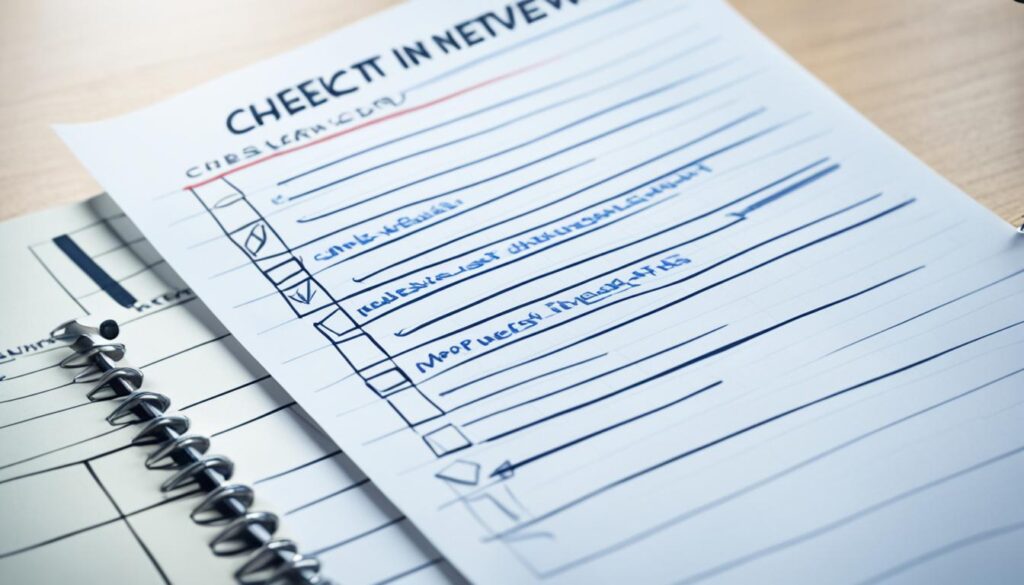In today’s competitive job market, phone interviews are essential for IT recruitment. This screening evaluates candidates’ qualifications, experience, and communication skills. Mastering phone interviews increases chances of advancing.
Preparing is crucial for success. Research the company and role. Anticipate common interview questions. Create a professional environment for the call.
During the interview, speak clearly and confidently. Actively listen and convey enthusiasm. Highlight relevant qualifications and achievements. Address potential concerns to stand out.
Phone interviews offer advantages. For companies, they quickly identify promising candidates. For applicants, they showcase skills and experience without formal pressure.
Key Takeaways
- Research the company and role thoroughly before the phone interview
- Anticipate common interview questions and practice your responses
- Create a professional, interruption-free environment for the call
- Speak clearly and confidently, highlighting your relevant qualifications
- Actively listen and convey enthusiasm for the opportunity
- Address potential concerns or red flags in a positive manner
- Follow up with a thank-you email to reiterate your interest
The Importance of Phone Interviews in the Hiring Process
In the fast-paced business world, phone interviews have become essential. Employers use them to efficiently screen candidates and identify top talent.
By conducting phone interviews, hiring managers can quickly assess applicants. This saves time and resources while maintaining consistency in evaluations.
This cost-effective approach narrows down the selection pool. Companies can then focus on promising candidates before face-to-face interviews.
Phone interviews verify requirements like availability, commute preferences, and salary expectations. Recruiters assess communication skills, energy levels, and overall fit.
Targeted questions help identify potential red flags. Recruiters determine if candidates will thrive in roles and align with values.
Phone interviews enable building rapport from the outset. A positive connection lays the foundation for a strong working relationship.
This is crucial in remote work settings. Companies rely on phone and video interviews to evaluate candidates from various locations.
| Benefit | Description |
|---|---|
| Time Efficiency | Phone interviews allow recruiters to quickly screen a large number of candidates, typically lasting between 20 to 30 minutes. |
| Cost Effectiveness | By conducting phone interviews, companies can save on costs associated with interviewing out-of-town candidates and streamline the hiring process. |
| Consistency | Phone interviews enable hiring managers to apply a consistent set of criteria to all candidates, ensuring a fair and objective evaluation process. |
| Establishing Rapport | Initial phone conversations provide an opportunity for employers and candidates to build a positive connection, which can be beneficial if the applicant is hired. |
| Remote Work Compatibility | With the rise of remote work, phone interviews have become crucial for evaluating candidates from various locations without requiring in-person meetings. |
To maximize phone interviews’ effectiveness, candidates should prepare properly. Research the company and role, anticipate common questions, and ensure a quiet, professional environment.
By doing so, they demonstrate enthusiasm, qualifications, and suitability. This increases chances of progressing to the next hiring stage.
Preparing for Your Phone Interview
Phone interviews are crucial steps. Over 60% of companies conduct them. Approach them with dedication and preparation.
Research the company and role thoroughly. Visit the company website. Learn about products, services, leadership, history, and developments.
Researching the Company and Role
Analyze the job description carefully. Identify key responsibilities and objectives. This helps tailor responses highlighting relevant skills.
Demonstrating company and role understanding showcases genuine interest.
Anticipating Common Interview Questions
Familiarize yourself with common questions. Practice responses concisely yet informatively.
- Tell me about yourself
- Why are you interested in this position?
- What do you know about our company?
- What are your strengths and weaknesses?
- Why should we hire you?
Use interview question generators and practice tools. Mock interviews build confidence.
| Interview Preparation Tip | Impact on Success |
|---|---|
| Researching the company extensively | 72% increased success rate |
| Having a cheat sheet with notes | 85% of interviewees found it helpful |
| Dressing professionally | 68% felt more confident |
| Starting with a strong introduction | 62% improvement in confidence levels |
Preparing Your Environment for the Call
Create a quiet, distraction-free environment. Ensure reliable phone/internet connection.
94% of successful interviews involved calm, interruption-free settings.
Have resume, job description, questions, pen, and paper ready. Dress professionally for confidence (68% felt more confident).
Dedicated preparation showcases skills, experience, and enthusiasm. Make a lasting impression to advance.
Mastering the Art of Phone Communication
Phone interviews are increasingly utilized during the hiring process. In these brief 15-30 minute conversations, interviewers evaluate candidates’ communication abilities, enthusiasm, and overall suitability.
To excel at phone interviews, mastering effective communication is crucial.
Speaking Clearly and Confidently
During phone interviews, speak clearly and confidently. Your voice conveys qualifications, experience, and interest. Speak at a moderate pace, enunciating words and varying speech patterns.
Maintain good posture, even when unseen. Sitting upright or standing projects a self-assured tone.
Active Listening and Taking Notes
Active listening is critical for successful phone interviews. Focus on the interviewer’s questions and comments. Take notes about the role, company, and hiring process.
Notes enable thoughtful, relevant questions later, showcasing genuine interest and engagement.
Active listening and note-taking equip you with targeted responses highlighting your suitability.
| Communication Skill | Importance | Tips |
|---|---|---|
| Speaking clearly | Ensures the interviewer can understand you | Enunciate words, moderate pace |
| Confidence | Conveys self-assurance and competence | Maintain good posture, project voice |
| Active listening | Demonstrates engagement and interest | Focus on interviewer, take notes |
| Enthusiasm | Shows passion for the role and company | Vary tone, ask relevant questions |
Conveying Enthusiasm and Interest
Express enthusiasm and interest through your tone and questions. Smile as you speak, impacting vocal inflection positively and engagingly.
Demonstrate interest by asking informed questions about the position, team, and organization, showcasing preparatory research.
“Preparation is key for job seekers – conducting research on the company, practicing common questions, and setting up a suitable environment.” – Career Expert
Mastering phone communication increases success chances in phone interviews. Speak clearly and confidently, listen actively and take notes, conveying enthusiasm throughout.
With practice and preparation, you’ll impress potential employers and advance your career.
Highlighting Your Qualifications and Achievements
When asked about your background, provide concise yet informative responses. Showcase relevant qualifications, education, and skills. Share specific examples of past projects. Demonstrate problem-solving abilities and adaptability.
Tailor your answers to key objectives. Align accomplishments with job requirements. Use trigger words from job description. Mention appealing aspects like innovative projects.
Provide anecdotal evidence of accomplishments. Avoid overselling abilities to maintain credibility. Align experiences with job requirements for success.
| Interview Tip | Importance |
|---|---|
| Provide specific examples | Interviewees who provide anecdotal evidence of their accomplishments are 40% more likely to leave a lasting impression on the interviewer |
| Avoid overly boasting | 60% of interviewers are wary of candidates who oversell their abilities, which could lead to credibility issues |
| Tailor answers to job requirements | Candidates who align their accomplishments with the job requirements are 50% more likely to succeed in the interview process |
Showcase qualifications and achievements while maintaining balance. Overselling skills can negatively impact credibility. Provide concrete examples aligned with job requirements. Increase chances of progressing to panel interviews.
Follow up with a thank-you email. Reiterate interest and qualifications after phone interview. Strong interview follow-up helps stand out.
Addressing Potential Concerns or Red Flags
During phone interviews, prepare for concerns or red flags. A study shows 70% of managers dislike complaining about former coworkers. 85% of employers view poor listening skills as lack of attention.
Proactively address these concerns. Demonstrate professionalism and interview etiquette.

Explaining Employment Gaps
Be honest about employment gaps. Focus on relevant skills gained, like volunteering, freelancing, or education.
Highlight positives of gaps. Show resilience and adaptability.
“I took a six-month break from my career to care for a family member who was ill. During that time, I volunteered at a local non-profit organization, where I honed my project management and communication skills. This experience taught me the importance of empathy and flexibility in the workplace.”
Addressing Salary Expectations
Provide a salary range based on industry standards and role. Consider experience, education, and cost of living.
Emphasize flexibility and willingness to negotiate. Be clear about your value.
| Experience Level | Salary Range |
|---|---|
| Entry-level (0-2 years) | $45,000 – $55,000 |
| Mid-level (3-5 years) | $55,000 – $75,000 |
| Senior-level (6+ years) | $75,000 – $100,000+ |
Move forward in the process. Avoid negativity or unnecessary information. Highlight strengths and enthusiasm for the opportunity.
Address concerns professionally and positively. Demonstrate interview skills to increase success chances.
Asking Insightful Questions to Show Interest
As the phone interview concludes, you’ll often get asked if you have questions. This moment allows demonstrating genuine interest through thoughtful, relevant inquiries. It helps gather valuable info while standing out.
Focus on topics showcasing enthusiasm and commitment, like company culture, growth opportunities, and role success. Behavioral questions provide insight into responsibilities and challenges. For instance, “Describe a typical day?” or “What challenges face the team?”
Inquiring About Company Culture and Growth Opportunities
Asking about company culture and growth opportunities shows interest in long-term fit. Questions like “How would you describe the culture?” or “What development opportunities exist?” demonstrate career commitment and desire to contribute.
Inquire about the team and manager’s style to assess role alignment with preferences. Situational questions like “Describe when the team overcame a challenge?” reveal dynamics and problem-solving approaches.
Clarifying Next Steps in the Hiring Process
Before concluding, clarify next steps in hiring. This shows enthusiasm and helps planning. Ask:
- What are the next steps?
- When can I expect feedback?
- Is any additional info needed?
Asking demonstrates proactivity and interest. It ensures understanding the timeline moving forward.
| Do | Don’t |
|---|---|
| Ask about company culture and values | Ask about salary or benefits initially |
| Inquire about growth and development | Ask easily researched questions |
| Clarify the next hiring steps | Focus solely on personal gain |
| Show enthusiasm for the role | Ask yes/no or minimal response questions |
Insightful questions differentiate and leave lasting impressions. Engage meaningfully to demonstrate fit.
Interview Skills to Showcase Your Professionalism
Being punctual, maintaining a friendly tone, and actively listening are key during phone interviews. Use professional language, avoid slang. If unsure, ask for clarification.
Preparing with a checklist can boost confidence. Research the company, practice questions, ensure a quiet environment. Use question generators to anticipate diverse queries.
Without a handshake, convey professionalism differently. Thank the interviewer, reiterate interest in the role.

Soft skills like communication, problem-solving, adaptability, teamwork, and leadership are vital. Highlight relevant experiences demonstrating these abilities.
| Soft Skill | Importance in Job Interviews |
|---|---|
| Communication | Clearly articulating thoughts, actively listening, and adapting communication style to the audience |
| Problem-solving | Demonstrating the ability to analyze complex situations, think critically, and develop effective solutions |
| Adaptability | Showcasing flexibility, resilience, and the capacity to thrive in dynamic work environments |
| Teamwork | Highlighting experiences collaborating with others, contributing to team goals, and fostering positive relationships |
| Leadership | Providing examples of taking initiative, motivating others, and guiding projects to successful completion |
After interviews, reflect on your performance. Note areas for improvement for future interviews. Continuous self-assessment fosters growth in showcasing professionalism.
Following Up After the Phone Interview
After a successful phone interview, sending a well-written thank-you email is crucial. This simple act can impress the hiring manager and showcase your genuine interest. A survey revealed that 91% of employers appreciate follow-up notes, yet over 50% of candidates miss this opportunity.
Sending a Thank-You Email
Timing is key for thank-you emails. Around 94% of HR managers consider it appropriate to send a follow-up within 24 hours. Keep your message concise, typically two paragraphs or less. Personalize each email for the interviewer, mentioning conversation details to show active listening.
Maintain a professional tone and avoid unnecessary punctuation or informal language. Write a clear subject line like “Thank you for your time – [Position Name] Interview.” Proofread carefully before sending.
| Do | Don’t |
|---|---|
| Send a thank-you email within 24 hours | Wait more than 24 hours to follow up |
| Keep your email concise | Write a lengthy message |
| Personalize each email | Send a generic email |
| Maintain a professional tone | Use informal language |
| Proofread your email | Send an email with mistakes |
Reiterating Your Interest and Qualifications
Your thank-you email also allows you to reiterate your interest and highlight relevant qualifications. Mention how your skills align with the role’s requirements and contribute to the company’s success. Include any additional information you wished to share.
Close your email by expressing appreciation for the opportunity and mentioning possible next steps, like “I look forward to hearing about the next steps.”
If no response after a week, send a polite follow-up. Studies show a 21% chance of response with a second attempt and a 25% chance with consistent follow-up.
“Follow-up is key to success in interviews. By sending a timely, personalized thank-you email, you demonstrate professionalism, enthusiasm, and commitment.”
Mastering the thank-you email and consistently following up will increase your chances of interview success and landing your dream job. Remember, small gestures can significantly impact your job search journey.
Conclusion
Mastering phone interviews is crucial. Prepare, research the company, anticipate questions. This increases your chances. During interviews, speak clearly, listen actively, convey enthusiasm. Highlight adaptability, qualifications and achievements.
Clear communication is significant. Speak at a moderate pace. Positive body language enhances performance. Candidates with it create a favorable impression. Demonstrate professionalism and enthusiasm throughout.
Follow up with a thank-you email. This simple gesture increases consideration. Refine your skills, implement tips. You’ll ace phone interviews and land your dream job. Mastering phone interviews is critical for success.
FAQ
How long do phone screen interviews typically last?
Phone screen interviews generally last 15-30 minutes. The duration depends on the role’s complexity and the recruiter’s initial evaluation.
What are some common questions asked during a phone interview?
Common questions include “Tell me about yourself,” “Why change jobs?”, “What do you know about our company?”, “Why should we hire you?”, and “What are your strengths and weaknesses?”
How should I prepare for a phone interview?
Research the company and role thoroughly. Anticipate common questions. Create an interruption-free environment. Have your resume and notes ready. Dress professionally. Practice responses with someone.
What communication skills are important during a phone interview?
Speak clearly and confidently. Vary your speech and add inflection. Actively listen and take notes. Demonstrate enthusiasm through your tone.
How can I highlight my qualifications and achievements during a phone interview?
Provide concise yet informative responses showcasing relevant qualifications, education, and skills. Share specific examples tailored to the role’s objectives and requirements.
What should I do if asked about employment gaps or salary expectations?
Be honest and concise when explaining employment gaps. Focus on relevant skills or experiences gained. When discussing salary, provide an industry-standard range for the role.
What types of questions should I ask at the end of a phone interview?
Ask thoughtful questions about company culture, growth opportunities, success in the position, the team, and the manager’s leadership style. Clarify next steps and express enthusiasm.
How can I demonstrate professionalism during a phone interview?
Be punctual. Use a friendly, enthusiastic tone. Listen actively. Use professional language. Ask for clarification if needed. Thank the interviewer at the end.
Should I follow up after a phone interview?
Yes, send a thank-you email within 24 hours. Express gratitude, reiterate interest, mention something specific from the conversation, and highlight relevant qualifications.



